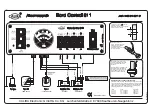
How you adjust your seats and seat-
backs can also affect your safety. For
example, sitting too close to the
steering wheel or dashboard
increases the risk of you or your
passenger being injured by striking
the inside of the car, or by an
inflating airbag.
Reclining a seat-back too far reduces
the seat belt’s effectiveness and
increases the chance that the seat’s
occupant will slide under the seat
belt in a crash and be seriously
injured.
Head restraints can help protect you
from whiplash and other injuries. For
maximum protection, the back of
your head should rest against the
center of the head restraint.
Your car’s seats are designed to keep
you in a comfortable, upright
position so you can take full
advantage of the protection offered
by seat belts and the energy
absorbing materials in the seats.
Move the front
seats as far back as possible, and
keep adjustable seat-backs in an
upright position whenever the car is
moving.
Keeping your doors locked reduces
the chance of being thrown out of
the car during a crash. It also helps
prevent occupants from accidentally
opening a door and falling out, and
outsiders from unexpectedly opening
your doors.
Seats & Seat-Backs
Head Restraints
Door Locks
What you should do:
Driver and Passenger Saf ety
Your Car’s Safety Features
11
02/02/01 15:03:54 31S5B600 0014
Main Menu
Table of Contents
▲
▼













































